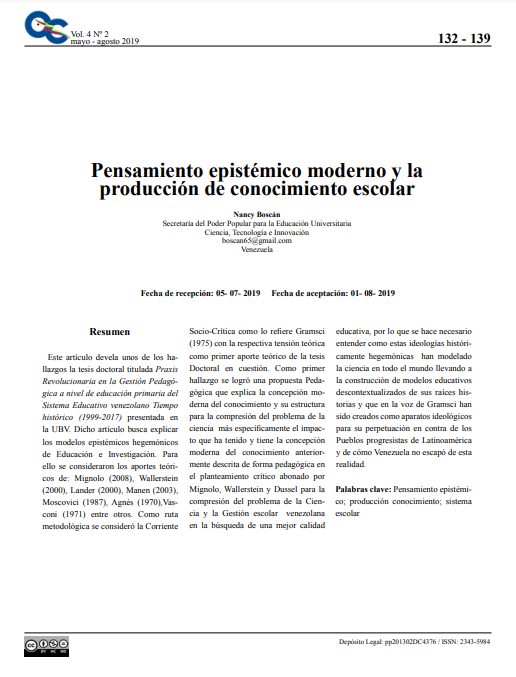Modern epistemical thinking and the production of school knowledge
Keywords:
Epistemic thought, knowledge production, school systemAbstract
This article reveals some of the findings of the doctoral thesis entitled Revolutionary Praxis in Pedagogical Management at the primary education level of the Venezuelan Historical Time Education System (1999-2017) presented at the UBV. This article seeks to explain the hegemonic epistemic models of Education and Research. For this, the theoretical contributions of: Mignolo (2008), Wallerstein (2000), Lander (2000), Manen (2003), Moscovici (1987), Agnés (1970), Vasconi (1971) among others were considered. As a methodological route the Socio-Critical Current was considered as Gramsci (1975) refers to it with the respective theoretical tension as the first theoretical contribution of the Doctoral thesis in question. As a first finding, a Pedagogical proposal was achieved that explains the modern conception of knowledge and its structure for the understanding of the problem of science, more specifically the impact it has had and has the modern conception of knowledge previously described in a pedagogical way in the critical approach paid by Mignolo, Wallerstein and Dussel for the understanding of the problem of Venezuelan School Science and Management in the search for a better educational quality, so it is necessary to understand how these historically hegemonic ideologies have modeled science throughout the world leading to the construction of decontextualized educational models of their roots stories and that in Gramsci's voice have been created as ideological devices for their perpetuation against the progressive Peoples of Latin America and how Venezuela did not escape from this reality.
Downloads
References
Armatte, M. (2005). La Notión de modele Dans les Scienses Sociales. No 12. 172. Francia. Traducción de José María arribas macho (p 91-123)
Barreara, M. (2007). Modelos epistémicos en educación e investigación. Sypal. Quirón Ediciones (cuarta edición) Venezuela
Del Re, G. (2000). Modelos y analogías de la ciencia. HYLE. Diario internacional de filosofía de Chemistre.Vol.6, No 1. Universidad de Karlsruhe. Alemania Documento en línea
Ferrarter, M. (2001). Diccionario de filosofía. Tomo III.K-P. Nueva edición Actualizada. Ariel Referencia. Editorial Ariel.2da reimpresión. España
Mignolo, W. (2003). Historias locales/diseños globales: colonialidad, conocimiento subalterno y pensamiento fronterizo. Madrid España.
Lander, E. (2000). Ciencias sociales: saberes coloniales y Eurocéntrico. CLACSO, Consejo Latinoamericano de Ciencias Sociales, Buenos Aires, Argentina, p. 246
Real Academia Español (2001). Diccionario de la Real Academia Española. (Vigésima segunda Edición).España. Documento en línea.
Wallerstein, I. Análisis de sistemas-mundo. Una introducción. Madrid: Siglo XXI Editores
La educación y los Organismos Internacionales de crédito. Préstamos y recomendaciones para América Latina (2000-2015). María Betania Oreja Cerruti y Susana E. Vior. Journal of Supranational Policies of Education, Nº 4, pp. 18.

Downloads
Published
How to Cite
Issue
Section
License

This work is licensed under a Creative Commons Attribution-NoDerivatives 4.0 International License.







